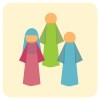Joseph
 Joseph was the first son of Rachel, whom Jacob loved more than all his other wives. Since Jacob already had fathered 10 other sons, Joseph was his eleventh son. Benjamin later would be born to Jacob and Rachel, but sadly, Rachel would die giving birth to him (see Gen. 35:16-20).
Joseph was the first son of Rachel, whom Jacob loved more than all his other wives. Since Jacob already had fathered 10 other sons, Joseph was his eleventh son. Benjamin later would be born to Jacob and Rachel, but sadly, Rachel would die giving birth to him (see Gen. 35:16-20).
Jacob “loved Joseph more than his other sons because Joseph was born to him in his old age” (37:3). Joseph had some dreams he shared with his family—dreams that easily could be understood as representing scenarios in which his family members bowed down to him. Needless to say, this didn’t go over well at all. Also, Jacob gave Joseph a special gift, a multi-colored coat, or a coat with long sleeves. His brothers were intensely jealous, and when they had opportunity, they sold Joseph into slavery. Some of the brothers considered killing him but decided against it. The brothers stained Joseph’s coat with goat’s blood and showed the coat to their father, who concluded Joseph had been attacked and killed by a wild animal. Jacob mourned over his son for a long time.
Meanwhile, Joseph became a servant at the home of Potiphar, an official to Pharaoh, king of Egypt. Joseph served Potiphar well but was thrown into prison when he was unjustly accused of trying to seduce Potiphar’s wife. Ironically, it was Potiphar’s wife herself who accused Joseph, even though she had tried to entice him to sleep with her!
While in prison, Joseph trusted God and made the best of his situation. The Lord blessed him, and he won the respect of the prison warden. When two of Pharaoh’s attendants who also were in prison dreamed dreams they could not understand, Joseph correctly interpreted the dreams. Eventually, because of these correct interpretations, Joseph was summoned to appear before Pharaoh because he—Pharaoh—had had dreams he didn’t understand. The dreams were prophetic, foreshadowing seven years of abundant harvest and then seven years of famine. Joseph recommended to Pharaoh that he place someone in charge of preparing for the lean years, and Pharaoh rightly assigned the task to Joseph.
After the years of plenty had come and gone, a prolonged famine took hold. Grain was available in Egypt because of Joseph’s wise planning, and people came to Egypt to buy food. Joseph’s brothers were among those who came, and Joseph recognized them immediately. He did not reveal himself to his brothers right away but gave them a series of tests to see how they would respond. Eventually he did tell them who he was, and he invited them to relocate in Egypt. Joseph’s brothers were worried he would seek revenge, but Joseph forgave them and reassured them, saying that “it was not you who sent me here, but God” (45:8; see also 50:15-21).
Just before his death at age 110, Joseph made his brothers promise that his bones would be taken from Egypt when God orchestrated the departure of His people from that country (see vv. 24-26). The writer of Hebrews noted this in what we now know as Hebrews 11:22: “By faith Joseph, as he was nearing the end of his life, mentioned the exodus of the Israelites and gave instructions concerning his bones.”
Unless otherwise noted, all Scripture quotations in SundaySchoolZone.com materials are taken from the Holman Christian Standard Bible®, Copyright © 1999, 2000, 2002, 2003, 2009 by Holman Bible Publishers. Used by permission. Holman Christian Standard Bible®, Holman CSB®, and HCSB® are federally registered trademarks of Holman Bible Publishers.



